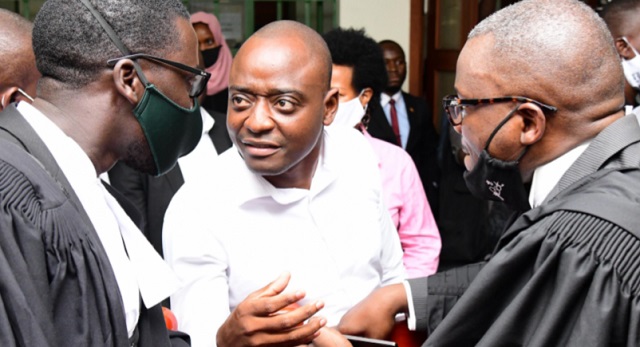
Experts warn of dire consequences for the private sector, government in relation to access to capital
Kampala, Uganda | RONALD MUSOKE | Capital inflow in form of loans is big business in Uganda. In both the private and public sectors, loans secured from foreign investors boost service delivery, improve people’s livelihoods, and contribute to local and national tax revenues.
But the recent court judgment that involved Hamis Kiggundu, a youthful Kampala businessman and Diamond Trust Bank Kenya and its Ugandan subsidiary, means that the window for attracting foreign loans could brusquely be shut, according to legal and economic experts.
The Commercial Court in Kampala, on Oct.07, ruled that the credit facilities DTB Kenya had extended to Kiggundu is illegal since it is not licensed by Bank of Uganda as required under the laws that govern financial business in Uganda.
However, in a statement released in the early morning hours of Oct.14, Emmanuel Tumusiime-Mutebile, the Governor Bank of Uganda, clarified that foreign banks lending deposits held in jurisdictions other than Uganda are regulated and supervised by their home authorities.
Mutebile said it is not mandatory for a foreign bank to establish a representative office in Uganda in order to conduct lending or non-deposit taking activity.
“The Central Bank’s regulatory and supervisory powers only apply to financial institution business conducted by Bank of Uganda-licensed entities in or outside Uganda or activity which should be licensed as such in Uganda…These powers do not extend to activities of foreign banks outside Uganda licensed by foreign regulations,” he said.
“Bank of Uganda does not regulate extension of loans/credit or the financing of commercial transactions that are funded using funds owned privately by individuals, corporate, private equity funds (either local or foreign),” he added.
This development is essential but it could require much more than the clarification for the Court of Appeal to overturn the Commercial Court decision and rebuild investor confidence.
In a show of solidarity, 35 chief executive officers of financial institutions under their umbrella, the Uganda Bankers Association (UBA), have joined DTB Kenya and its Ugandan counterparty, in the appeal case at the Court of Appeal.
The bank’s executives argue that accessing loans from other countries other than Uganda is normal and that such judgment risks commercial banks losing over Shs5.7trillion (US$1.53bn) in syndicated loans spanning across various sectors including; real estate, road construction, energy covering hydroelectric power, oil and gas and manufacturing among others. This, however, excludes loans extended to the government.
Chacha Odera, a Nairobi-based lawyer who does work for several private banks including Diamond Trust Bank Kenya told an online seminar of members of the Uganda Law Society on Oct. 14 that Kenyan banks are at the moment reviewing their participation in regional projects.
“We need to be extremely cautious, otherwise, a dangerous precedent will be set where someone can walk across the border, apply for a loan in Kenya, get it and then call it illegal,” Odera told a zoom meeting organized by the Uganda Law Society to discuss the legal, economic and political implications of the judgment that has since sent shockwaves across the region.
Odera said, over the years, regional banks have been lending money to finance big infrastructure projects. This is because, he said, local banks cannot muster such huge amounts to finance these projects.
He said given the sheer amount of money often required to finance big infrastructure projects such as the Mombasa oil pipeline, the Turkana Wind Project, the Nairobi-Mombasa Expressway, banks often go beyond their jurisdictions to undertake such financing; otherwise majority of the projects in the region would not take off.
Dr. Fred Muhumuza, an economist based at Makerere University has also weighed in on the judgment. He told another online forum that Uganda has limited capital, adding that it has been the practice to go abroad for local borrowers.
He said, should the judgment stand, it will have a big impact across the entire economy including the insurance sector. He added that the decision would also cause a jump in the cost of credit if financial institutions are unable to use the same arrangement to source foreign funding.
Similarly, Prof. Agasha Mugasha, an expert in international financial law, banking law and commercial law noted in his paper published on Oct.10 that “the judgment is disturbing for any business with cross-border operations.”
Prof. Mugasha, who is also a visiting professor at Bishop Stuart University in Mbarara, said the court decision has alarmed the financial service industry and the legal profession in Uganda and possibly in the wider eastern Africa region because it struck at the heart of the growing trade in cross-border financial services.
 The Independent Uganda: You get the Truth we Pay the Price
The Independent Uganda: You get the Truth we Pay the Price



As a journalist you should at least show some pretence of impartiality when reporting or feigning analysis & not merely regurgitating the talking points of oneside of a dispute i.e UBA,DTB etc.
The sustained media smear campaign against Justice Dr. Adonyo & Ham Kiggundu won’t substitute the need to appeal & provide compelling legal arguments for reversal of Justice Adonyo’s rulling i.e the illegal operations of DTB-Kenya on Ugandan territory.
Repeatedly quoting the Governor Bank of Uganda’s recent press release won’t change the facts that DTB-K was declared to be illegally operating on Ugandan territory.
And besides you miss the point that powers of interpretation of the law or the powers of declaring what is or isn’t illegal are a monopoly of the Judiciary hence the governor was merely sharing his layman opinions of legal matters.
As for the threats of Uganda being blocked from accessing kenyan capital, you do forget that most of the bank loans are denominated in Uganda shillings. Consequently if need be, Uganda Govt could print the needed capital (Uganda shillings) & lend it to the commercial banks or even Uganda Development Bank for onward lending negating the need for foreign capital.
As for demands that the East African court stops Ugandan courts from making further judgements on the dispute after DTB-K is declared the winner of the dispute, …….
DEAR BISASO, DO YOU EVEN KNOW THE IMPLICATION OF BOU /GOVERNMENT PRINTING MORE MONEY ON THE ECONOMY? LOOK BACK AT WHAT HAPPENED TO MUGABE’S REPUPLIC.
Congratulations Ronald Musoke on a well researched article.
You have collected and summarized opinions on the topic from educated stakeholders for your readers.